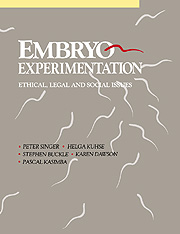Book contents
- Frontmatter
- Contents
- Foreword
- ACKNOWLEDGEMENTS
- INTRODUCTION
- PART 1 THE SCIENTIFIC ISSUES
- PART 2 THE ETHICAL ISSUES
- ARGUMENTS ABOUT THE STATUS OF DIFFERENT DEVELOPMENTAL STAGES
- 5 Fertilization and moral status: A scientific perspective
- 6 Segmentation and moral status: A scientific perspective
- 7 Individuals, humans and persons: The issue of moral status
- ARGUMENTS FROM POTENTIAL
- EMBRYO RESEARCH AND WOMEN
- PART 3 CONTROLLING EMBRYO EXPERIMENTATION IN A DEMOCRATIC SOCIETY
- FORMING A PUBLIC POLICY
- LEGISLATION AND ITS PROBLEMS
- APPENDICES
- GLOSSARY
- NOTES ON CONTRIBUTORS
- INDEX
7 - Individuals, humans and persons: The issue of moral status
Published online by Cambridge University Press: 05 June 2012
- Frontmatter
- Contents
- Foreword
- ACKNOWLEDGEMENTS
- INTRODUCTION
- PART 1 THE SCIENTIFIC ISSUES
- PART 2 THE ETHICAL ISSUES
- ARGUMENTS ABOUT THE STATUS OF DIFFERENT DEVELOPMENTAL STAGES
- 5 Fertilization and moral status: A scientific perspective
- 6 Segmentation and moral status: A scientific perspective
- 7 Individuals, humans and persons: The issue of moral status
- ARGUMENTS FROM POTENTIAL
- EMBRYO RESEARCH AND WOMEN
- PART 3 CONTROLLING EMBRYO EXPERIMENTATION IN A DEMOCRATIC SOCIETY
- FORMING A PUBLIC POLICY
- LEGISLATION AND ITS PROBLEMS
- APPENDICES
- GLOSSARY
- NOTES ON CONTRIBUTORS
- INDEX
Summary
Some well-known arguments against non-therapeutic embryo research rest on the premise that fertilization marks the beginning of ‘genetically new human life organized as a distinct entity oriented towards further development’, and the additional premise that it is wrong to destroy such life, either because of what it currently is, or because of what it has the potential to become. This type of argument, put forward in the majority report of the Australian Senate Select Committee on the Human Experimentation Bill 1985, can also be found in the Vatican's Instruction on Respect for Human Life.
We believe there are good reasons for rejecting this type of argument. In Section I of this chapter we outline the reasons why we should reject the view that a zygote or early human embryo is a distinct human individual; in Section II, we argue against the common view that an early embryo has a right to life because it is an innocent human being; in Section III, we put the argument that experimentation on early human embryos is no harder to justify than various other reproductive choices; and finally, in Section IV, we shall sketch a positive account of how we should think about embryo research.
It is often assumed that the answer to the question: ‘When does a particular human life begin?’ will also provide the answer to the question of how that life ought, morally, to be treated.
- Type
- Chapter
- Information
- Embryo Experimentation , pp. 65 - 75Publisher: Cambridge University PressPrint publication year: 1990
- 11
- Cited by

